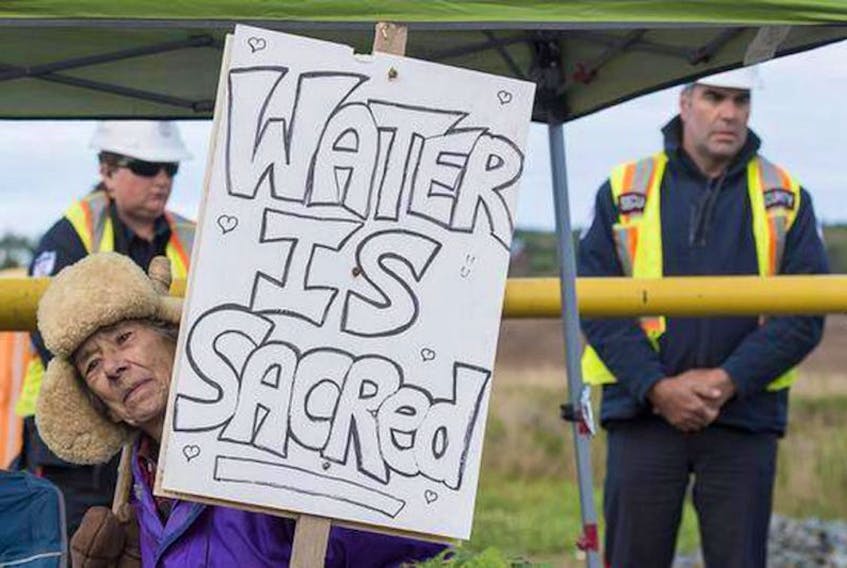A cone of silence still cloaks government communications with former Justice Department lawyer Alex Cameron.
Justice Duncan Beveridge reserved his decision Thursday on the province’s motion for a stay continuance to prevent a redacted version of Justice John Murphy’s 2018 decision against the province from going public. Cameron argued in a 2016 Alton Gas case brief that the Mi’kmaq people of the Sipekne’katik Band were a conquered people, and consequently, the provincial government did not have a duty to consult with the band about the project.
Premier Stephen McNeil later apologized to the Assembly of Nova Scotia Mi’kmaq Chiefs, saying he regretted the conquered people wording and that he had no previous knowledge of the phraseology Cameron used. The conquered people argument was then formally withdrawn and Cameron was removed from the case.
Cameron retired from the Justice Department in April 2017 after 26 years and subsequently sued the premier, the attorney general and the province for defamation, abuse of public office, constructive dismissal and a violation of his constitutional rights.
The Nova Scotia Supreme Court was tasked with determining if the instructions Cameron received from government on the Alton Gas appeal were solicitor-client privileged, and, if so, whether that privilege had been waived by government.
Justice John Murphy ruled in a written decision in May 2018 that the province had waived solicitor-client privilege. The written decision was released with the solicitor-client communication redacted.
The province appealed but Justice David Farrar of the Appeal Court dismissed the appeal last month, agreeing that the province had waived privilege in solicitor-client communications.
Farrar ordered that the Murphy decision remain redacted until noon on May 31.
The province then announced it was seeking to appeal to the Supreme Court of Canada and it was granted a request by the provincial Appeal Court to stay the order to extend the temporary sealing order and publication ban in the case that prevents the unredacted Murphy decision from being released to the public.
Beveridge listened to arguments Thursday in Appeal Court Chambers about whether to further extend the sealing order.
“These proceedings have been about solicitor-client privilege,” Rebecca Jones, lawyer for the province, told Beveridge. “That’s what it has always been about.
“It has not been about an attempt to control information or to avoid embarrassment.”
Jones argued that the solicitor-client privilege is “a substantive right of utmost importance” and that the privilege demands “absolute confidentiality status,” regardless of who is publishing it.
She said the privilege is not limited to communications between lawyer and client but extends to protection of all the facts associated with the relationship, including financial records.
The government would like the stay extended until the completion of its appeal in the Supreme Court of Canada, if the highest court decides its appeal warrants a hearing.
As Cameron looked on from the rear of the courtroom, his lawyer, Bruce Outhouse, argued that the appellants, the government, would not suffer irreparable harm if the unredacted decision were released.
“There is absolutely nothing in these redactions that the publication of which would cause the appellant irreparable harm,” anymore than did the redacted release of Murphy’s decision, he said.
“It’s just a question of them (government) trying to limit the information as much as possible and Mr. Cameron is still in the box that he was in.”
Outhouse described that box as considerable harm to Cameron’s personal and professional reputation that includes a financial hit.
“Who will suffer the most harm if the stay is granted? We say it is certainly Mr. Cameron in this case.”
Outhouse said Cameron is living under a cloud with the premier continuing to make disparaging remarks about his actions in the Alton Gas case, “while he remains unable to respond.”
Asked by Beveridge what he thought was supposed to be decided, Outhouse replied, “the issue for you today is would the release of these redacted reasons cause irreparable harm.”
Beveridge concluded by saying that the stay and the terms of the sealing order would continue while he ponders his decision and for two weeks after his written decision is delivered.
Outhouse said that the province’s appeal, if it is heard, could take 18 mnths to two years to wind its way through the Supreme Court of Canada. He argued that “it would be in the interest of justice” and in the interest of removing the cloud hanging over Cameron’s head to impose a term on the stay, if it is extended.
RELATED:









